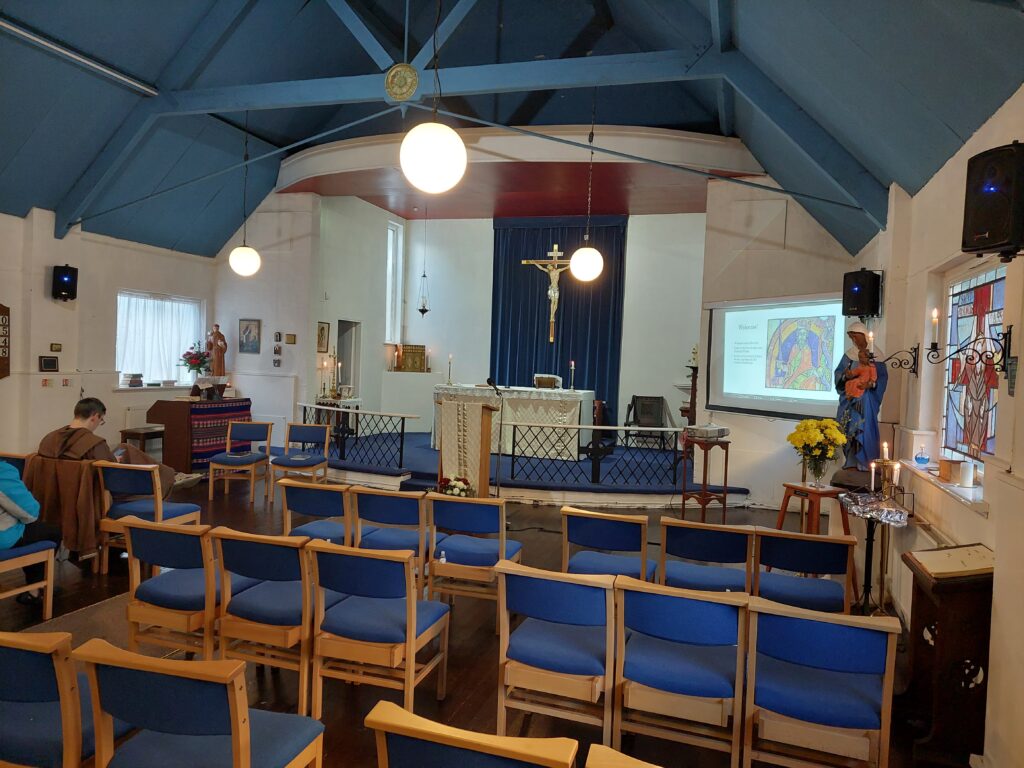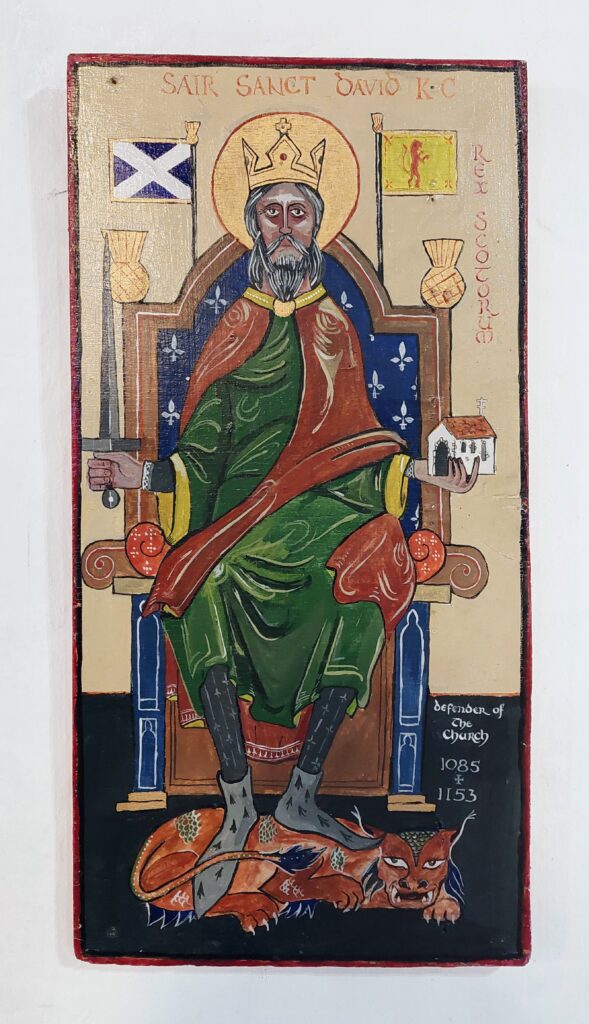Fr Stephen, our Rector, was invited to preach at the patronal feast of our neighbouring church of St David’s where our former associate priest, Br Joseph Emmanuel SSF, is the priest in charge and part of the new Franciscan community at the heart of Pilton. It is good to rebuild links between our two communities.

+ ‘Praise Lord, O you his saints, and give thanks to his holy name’. Ps 43.4
Thanks for invitation. Memories of good welcome when came before institution at HC, met on street! Great joy to see Franciscans back here and please to have a part in it thr Br Joe. Hope our three churches can wk together in friendship.
But here to celebrate your patron saint, David I, King of Scots, not King David in the Bible or St David of Wales, our own Scottish King David, son of St Margaret. A church is given a gift at its founding, a spirit and a saint. To survive and grow it has to be faithful to this original gift, however it may grow and change. In the case of a saint we also believe that they continue to take an interest in the place and people they have been given. They are with God, but if they are in God they can’t be indifferent to those God loves.
What is the gift of St David for this church. If you look him up you’ll find he was called ‘a sair sanct for the croun’ by his successor James VI, which the Royal Family website translates from the Scots as ‘too pious to make a successful monarch’, but on the other hand the modern historian Richard Oram describes him as ‘an aggressive warlord and a ruthless operator driven by ambition’. Does this mean that to be faithful to your spirit Br Joe needs to be ‘an aggressive and ruthless priest driven by ambition’. No, but it does raise this question, what is David’s gift for us?

We’ve got a good set of Bible readings to help us. In the gospel there’s the story of Philip and Nathaniel meeting Jesus. Jesus describes Nathaniel as ‘a true Israelite in whom there is no deceit’. Better than being a ruthless warlord. But just before that Nathaniel was less than complementary about Jesus and his home – ‘can anything good come our of Nazareth’, with the implication ‘no’. We might say ‘can.. Silverknowes’, or even ‘DMains’. It’s a common attitude. But Nathaniel’s friend Philip just replied ‘come and see’. Simply meeting people is often the best way to get rid of prejudice. But more than that we find Nathaniel coming to Jesus just as he is, with all his prejudices, a mix of good and bad like all of us – and he is transformed.
St David was the youngest son of King Malcolm Canmore and Queen Margaret, and the comments on him, ‘too pious to be a good king’ and ‘a ruthless warlord’, suggest that he too was a complex character. He had the good fortune to live and reign for many years and, through his many years in England, to be at the forefront of new developments in Europe, both secular and religious. These he brought to Scotland in what has been called the Davidian revolution – new towns and burghs, the first native coinage, feudalism and new families settling in Scotland, and new ways of taxation. He also brought new, European, customs in the Church, especially founding many new monasteries for the new religious orders such as the Cistercians. Europe in his time was in the throes of a religious revival and he brought it to Scotland. These monastic foundations, because of their expense, caused him to be called by James VI ‘a sair sanct for the croun’, but he founded them on the riches of his Cumbrian silver mines and they were an integral part of his renewing of Scottish society as a Christian society, something which has only recently broken up. Even Richard Oram admits ‘there is little doubt about his religious devotion’, something he may have learnt from his mother and the other saints at his court like Waldef of Melrose and Aelred of Rievaulx.
So what can we learn from our patron saint? Firstly, and especially in Scotland, we see that good things come from outside. David learnt much from his time in England, his mother St Margaret came from England and Hungary and also transformed the Scottish Church. Looking at our other national saints, Andrew came from the Holy Land and Columba came from Ireland. Today, in poor, secularised Scotland, where there is prejudice against immigrants and refugees, we should thank God for those who come here from outside and bring untold gifts to our Church and nation.
Secondly, we don’t need to be ruthless warlords but nor does being Christian mean being a wimp. We are called to stand up for truth and defend God’s friends the poor and weak. What we see from our St David, and from King David in the Bible, is that God works out his plans using our personalities with all their contradictions and weaknesses. St Francis lived just after St David but if they had coincided David would certainly have brought the Franciscans to Scotland as did his great-grandson King Alexander II. The witness of religious life, whether Franciscan or David’s Cistercians, is that God works through our poverty and weakness. David may have been a ruthless warlord but his monastic foundations reminds us that poor, fragile churches are those Jesus especially loves – something not everyone in the Church finds easy to grasp.
But finally, David shows us that we are called to respond to God’s call wherever we are and whoever we are, whether a Royal Warlord, a Mum, a pensioner, or a priest. All we need to do is what Samuel did in our first reading, listen to the quiet voice of God and say ‘speak Lord for your servant is listening’. Then we will follow David on the royal road to heaven, Jacob’s Ladder, and see what Jesus promised to Nathaniel, ‘heaven opened and angels ascending and descending on the Son of Man’.

